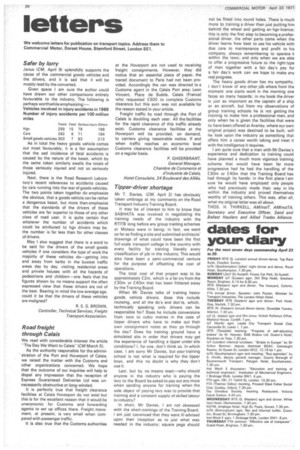Tipper-driver shortage
Page 38

If you've noticed an error in this article please click here to report it so we can fix it.
Mr T. Davies, (CM, April 2) has obviously taken umbrage at my comments on the Road Transport Industry Training Board.
It may be of interest to him to know that SABHATA was involved in negotiating the training needs of the industry with the RTITB long before any group training schemes or Motecs were in being; in fact, we went so far as finding a site and submitted architects' drawings of what could have been the first full-scale transport college in the country with every facility for training literally every classification of job in the industry. This would also have been a semi-commercial venture for the purpose of offsetting the cost of operations.
The total cost of that project was to be approximately £2m. which is a far cry from the £30m or E40m that has been frittered away by the Training Board.
When Mr Davies talks of training heavy goods vehicle drivers, does this include routeing, and all the do's and don'ts, which, technically speaking only drivers can be responsible for? Does he include conversions from tons to cubic metres in the case of tipper drivers who have to make out their own consignment notes as they go through the day? Does his training ground have a simulated site in order that drivers may get the experience of handling a tipper under site conditions? I. for one, don't think so. In which case. I am sorry Mr Davies, but your training school is not what is required for the tipper boys, and this no doubt is why they don't use it.
Last, but by no means least—why should anyone in the industry who is paying the levy to the Board be asked to pay out any more when sending anyone for training when the sole object of paying levy was to provide that training and a constant supply of skilled labour to industry?
In short, Mr Davies, I am not obsessed with the short-comings of the Training Board. I am just convinced that they were ill-advised upon their inception as to just what was needed in the industry; square pegs should not be fitted into round holes. There is much more to training a driver than just putting him behind the wheel and getting an hgv licence; this is only the first step to becoming a professional driver, the other parts come when the driver learns how best to use his vehicle with due care to maintenance and profit to his company, always remembering to operate it within the laws; and only when we are able to offer a progressive future to the right type of man together with a fair day's pay for a fair day's work can we hope to make any real progress.
The heavy goods driver has my sympathy. I don't know of any other job where from the moment one starts work in the morning one faces so many hazards; in my book the driver is just as important as the captain of a ship or an aircraft, but from my observations of group training schools he is not getting the training to make him a professional man, and only when he is given the facilities that were to have been offered at Averley, where our own original project was destined to be built, will he look upon the industry as something that offers him a career worth taking and treat it with the intelligence it requires.
I am quite sure that a man with Mr Davies's experience and dedication to training could have planned a much more vigorous training scheme that would have been far more progressive had he had the handling of the £30m or 40m that the Training Board has had through its hands: in the first place I am sure he would have employed only people who had previously made their way in life within the industry and proved themselves worthy of training others. This was, after all, what my original letter was all about.
THOS. H. THIRKELL, AM InstT, AMInstTA, Secretary and Executive Officer, Sand and Ballast Hauliers and Allied Trades Alliance.




























































































































